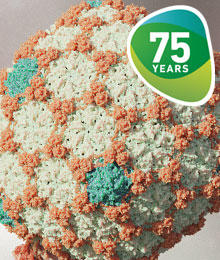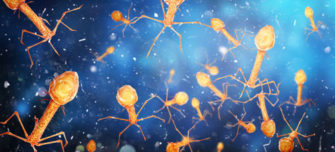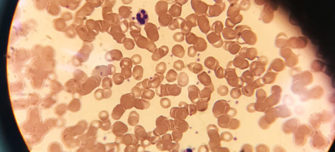The world of phage

What are phages?
Bacteriophages (or phages for short) are viruses that infect bacteria. They are composed of proteins and a DNA or RNA genome that can be very simple, containing four genes, or complex, with hundreds of genes. Phages are found in multiple locations, including in seawater, freshwater, soil and sewage slurries. Phages can transfer genes as a direct result of their replication cycle. To replicate, viruses hijack the bacteria’s replication software to replicate themselves. During this process, some viral DNA can be incorporated into the host’s genome. These new DNA strands can be obsolete, but they can also be genes for antimicrobial resistance or virulence, which have major implications for human and animal health.
When first discovered, there was considerable excitement around bacteriophages for their possible use as medicines in what has become known as phage therapy. As antibiotics were more effective and less expensive to produce, phage therapy was quickly side-lined. However, with the emerging threat of antimicrobial resistance, alternatives to antibiotics are needed, hence, could phage therapy be considered a viable option?
Why is understanding the world of phage important to microbiology?
Bacteriophages are considered the most abundant biological entities on Earth. It is hoped that bioinformatic and proteomic studies will lead to new opportunities for domain swapping, and the production of specifically engineered designer chimeolysins with diverse applications that will be part of the solution to the growing problem of antibiotic resistance.
Read more about why the world of phage matters to our members and the wider microbiology community, access our additional resources, including more about phage therapy, and continue to read more about why understanding genetics matters to microbiology as we explore restriction enzymes and genetic modification.
-
Microbiologists working in this area
To celebrate our 75th anniversary in 2020, we invited microbiologists to nominate the discovery or event that best showcases why microbiology matters and helps us demonstrate the impact of microbiologists past, present and future. Learn more about the microbiologists who are studying the world of phage.
-
Resources and further reading
Explore more about the discovery of bacteriophage and why this was such an important milestone in the history of microbiology, learn more about phage therapy, and discover the impact that giant phages have on the gut microbiome.
-
Restriction enzymes and the process of genetic modification
Many of the fundamental processes of biology were first elucidated in microbial systems – deciphering the genetic code, the one gene–one enzyme hypothesis, the mRNA hypothesis, the first genome sequences, and many more key biological breakthroughs were all the result of microbiologists.





